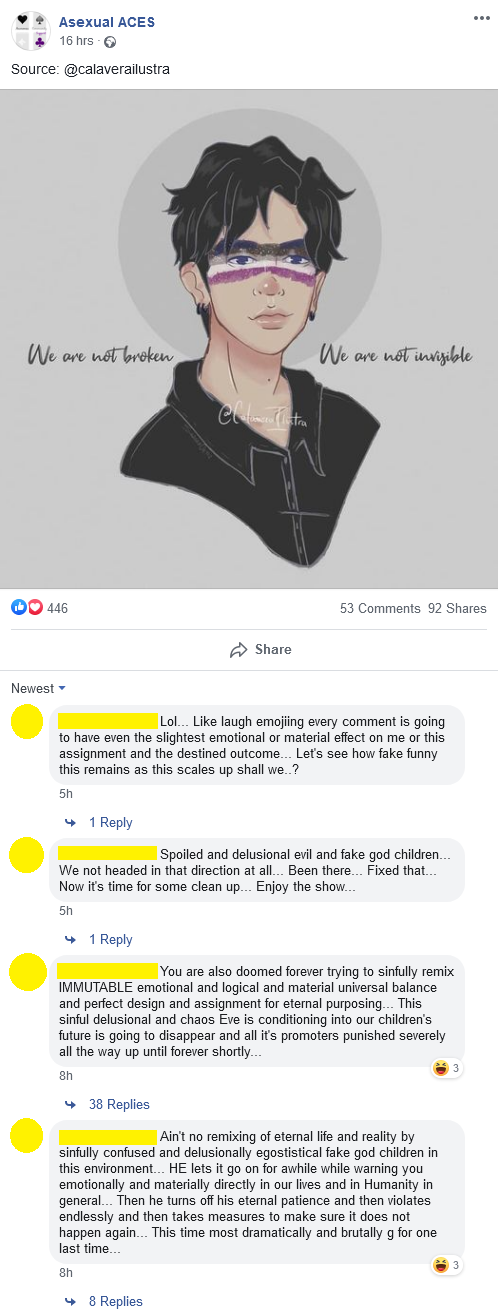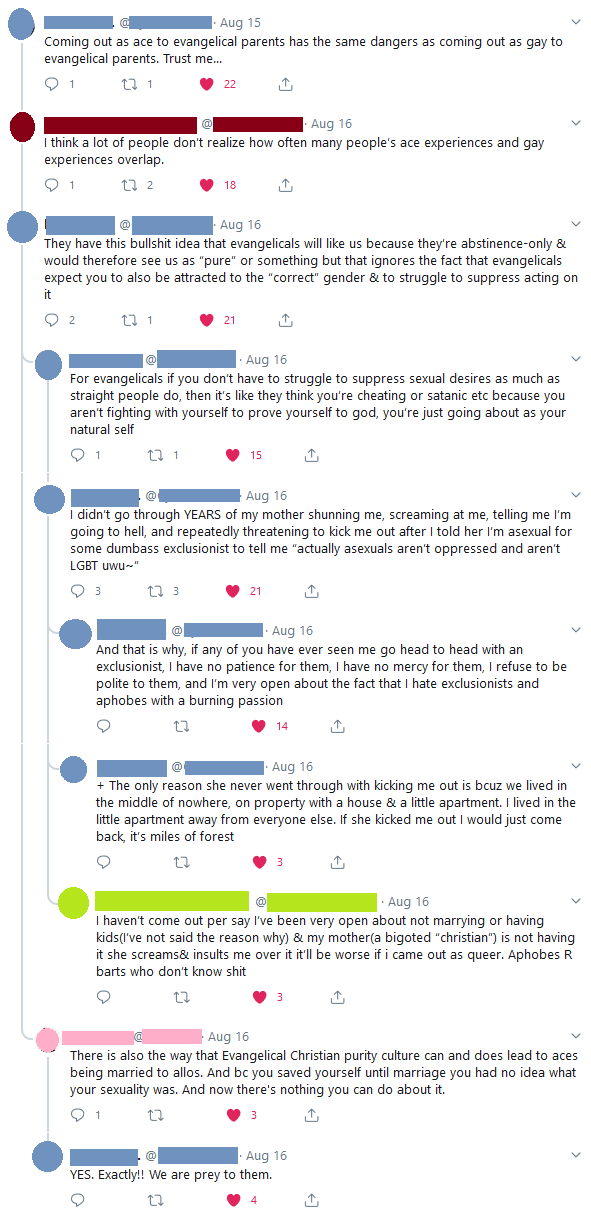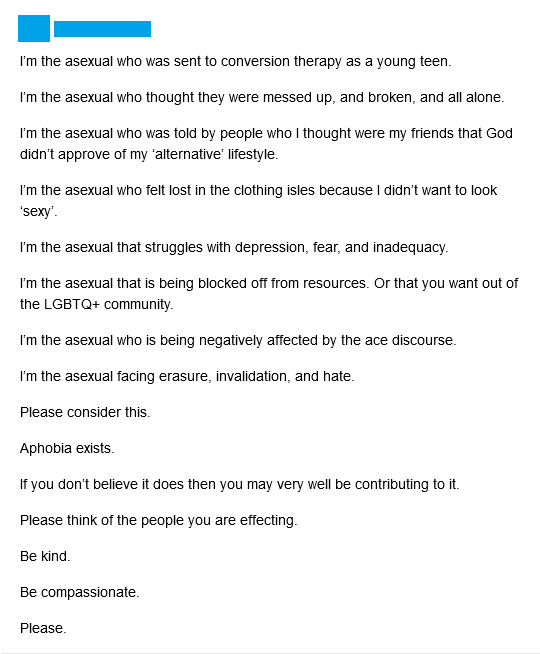○
ACT Aces: Asexual Experiences Survey
Excerpts:
«“Much Worse Stories”
It is significant in itself that so many respondents chose not to tick clearly relevant boxes because they did not think their experience was “serious enough”.
Many write-in responses began with phrases such as: “So I don’t know if this counts, but…” or “I know other people have had worse stuff…”
I have been catcalled, have had my ass grabbed, and had unsolicited nude photos sent to my phone, i luckily have been only minorly harassed but it still is valid and traumatic and I feel so much empathy for those who have that sexual abuse trauma.
-Taylor (Location Not Given)
Taylor describes having their “ass grabbed” and being sent nude photos without consent, actions which amount to criminal assaults in many jurisdictions. They describe this as being “only minorly harassed” and express compassion for the suffering of others, in part by subordinating their own trauma.
This attitude is representative of many respondents, each claiming others have been through more trauma than themselves, while they seem to want to justify talking at all about their own feelings, even as they diminished them by comparing their trauma to the that of the unnamed and unspecified“others”.»
«81.7% of all respondents reported experiencing at least one form of discrimination, oppression or violence. As the write-in answers led to new forms of abuse being added to each of the three original categories, the final results were consolidated into four new groups.
13.3% of respondents experienced some form of Institutional Discrimination. This primarily covers medical and workplace incidents, but also occasionally schools or religious institutions.
49.9% of respondents either told stories about, or ticked the boxes “Social exclusion” or “Exclusion from LGBTQIA+ spaces”. This also includes a small number of write-in stories that weren’t about specific acts of deliberate exclusion but about feeling excluded by the world in general.
Verbal/Emotional Abuse received the highest number of responses, at 75.4%. This category covers insults, acephobic rhetoric, shaming, and many instances of relationship abuse.
The Physical/Sexual Violence category contains a small number of cases of physical violence, and a larger number of experiences of sexual violence, from unwanted touching to rape. 13.0% of respondents experienced some form of violence.»
«4.1.1. Medical Discrimination (12.2%)
The majority of these stories were about doctors refusing to believe patients about their own sexual history or engaging in unethical, unprofessional or discriminatory behaviour.
There are some stories of doctors refusing to prescribe medication, provide emergency care or discuss issues unrelated to sex as a result of medical professionals fixating on “the libido problem”.
Both medical doctors and mental health professionals such as counsellors and therapists appeared in these stories.
I suffer from major depression, complex ptsd and various other diagnoses, when my doctor asked me about my sex life I briefly said that it wasn’t relevant because of my asexuality. The doctor then wanted to take me off of my meds that I needed, because he felt that my low libido was worse than me having suicidal thoughts. He kept saying it was my meds that caused it; despite me knowing and telling him that I’ve been identifying as asexual since I was 15 which was before I’d gotten on those medications.
He wouldn’t listen. I ended up in the e.r later because I got so depressed and was close to taking my own life. I had to switch doctors and I haven’t told my current one about my asexulity because I’m scared that they’ll take me off my meds again. –Lore (Sweden)
—
I went to urgent care for the third time after I couldn’t get a UTI to heal with the antibiotics they gave me and the female doctor flat out was like, “This is an STD and I won’t give you anymore meds unless you ADMIT you’re sexually active because you’re 26 and 26 year olds have sex. You are not a virgin and you are hurting yourself with your lies.” It was really scarring. –Isabella (USA)
4.1.2. Workplace Discrimination (1.9%)
This was less common than medical abuse, but there were more “Yes” responses than the survey authors expected. Some of the workplace discrimination involved being harassed at work, including sexually harassed. There was one story about being asked deeply personal questions by a boss during a one on one management conversation, and another about being left harassing pamphlets by coworkers.
I had a shift lead who continuously made sexual jokes and asked sexual questions about my life. After telling him im ace, he’s consistuantly made fun of me and encouraged others to make the same jokes and ask me the same questions. He’s also let me go from work early several times because “i cant pull the ‘sell them with sex’ approach with people” (its a pizza shop why the fuck do we have to use sex to sell it???) –Emma (USA)
4.1.3. Religious Exclusion (0.4%)
Write-in answers identified six cases of religious exclusion. These stories primarily related to disapproval of the person’s romantic orientation and insistence on the importance of marriage. These incidents are discussed in more detail in Section 1.6. Religion (pg.18).
My parents are strictly against anything to do with the LBGT+ community. They do not know of my orientation and may never know, but they talk about the community like a plague. And though I still find myself (romantically) attracted to the opposite gender, if they where to find out they would contact the church and be in despair for days. And though I’m unsure if I where to be kicked out, I know I would be shunned. -Sophie (USA)»
«4.3. Verbal/Emotional Abuse
Initially, seven forms of verbal or emotional abuse were included as checkboxes in this section of the survey. Five additional categories were added based on write-in responses (in yellow). These categories are recommended for any future survey.
The largest category, more than three quarters of respondents overall reported experiencing some
form of verbal or emotional abuse. Quantitative data about relationship abuse was not collected, but there was an opportunity to tell a story on that theme: 77 respondents did so. (Several also told stories under sexual violence that also fit this category).
The most frequent offender in the area of relationship abuse was “Asexuality blamed by partner for relationship problems”. 11.79% of respondents checked this box.»
«13% of respondents reported at least 1 incident of physical or sexual violence.
The nature of the stories provided by respondents are in many cases potentially distressing. Included below are some representative examples, and readers are advised to read with caution and be mindful of self -care.
My best friend assualted me when I said i did not want to join her and her boyfriend for a threesome. She threw me on the ground and beat me up, grabbed my hair and held my head back while her boyfriend poured rum down my throat -Linda (USA)
—
In fear of either being raped, physically or mentally abused by someone, I chose to have sex even though I didnt want to. -Quinn (Location Not Given)
—
My now ex-husband required that I provide him with at least two intimate sexual acts each week. Ten years ago he told me that the reason he had an affair and
contemplated ending our marriage was because I was not providing sufficient intimate sexual acts. That threat was held over my head for ten years. Under that duress, I have engaged in sexual acts that I did not want to be a part of at least twice a week for ten years. And it still wasn’t enough – throughout that 10 year period he had multiple affairs and has left me for his most recent sexual partner. -Ruby (Australia)
—
My ex forced himself on me because of my lack of interest in sex and sexual activity. And made me feel extreme guilt because he said I didn’t love him because I wasn’t interested in having sex with him -Lore (Sweden)
—
The first friend I ever told about my asexuality told me I was “too cute to be asexual”. He later took me out for drinks on my birthday, drugged me, and raped me in my own home. He tried to justify it later by saying that I didn’t know my own secret wants.
-Barbara (USA)
—
He raped me many times to try and convince me that I wasn’t asexual, and once time while trying to force my mouth open for oral sex he pulled the bottom bracket off of my braces. If I spoke about being uncomfortable with sex, he would suggest the idea of me drinking to get through it. –Aadya (India)»
«While it is difficult to compare the results of the full cohort (1595 respondents) with that of males only (91 respondents), this one statistic was sufficiently dramatic to warrant discussion.
The percentage of total respondents reporting rape and sexual assault is 4% and 9% respectively. For male-identifying respondents, the figures are much higher: 12% reported rape and 21% reported sexual assault (including the “Sexual Assault by Definition” category).»
«Male respondents who ticked the boxes for sexual assault and rape were less likely to share their story than female and non-binary respondents. Conversely, men who described sexual assaults in their stories were less likely to have checked the corresponding boxes. In many instances they
seemed unaware that what they have described is sexual assault or rape. This raises questions about what men know about consent and their rights to bodily autonomy – whether they are asexual or not.
A reminder must also be added here that the survey authors were unable to identify, except where that information was given, whether a respondent is transgender.»
See the whole survey here.
○
Letters to an Asexual #60 (Obsessive Harasser)
This is #60 of a series in which I read correspondence between me and people who have questions, comments, or–more often–misconceptions about asexuality. In this video, I share the harassing messages of a repeat offender who has been targeting queer activists for many years. Did you know asexuality isn’t normal and I need to see a therapist? Unless the therapist would tell me I’m fine, in which case therapists are crazy too? Maybe it would convince me if my harasser were to obsessively pore over my biographical details and try to use facts about my extended family against me? Because that’s something very stable people do to “help” people like me all the time!
○
This is #47 of a series in which I read correspondence between me and people who have questions, comments, or–more often–misconceptions about asexuality.
This video is about perspectives on asexuality within different religions. I share some other asexual people’s experiences and thoughts in a religious context.
Some religious quotes I mentioned:
“Now to the unmarried and the widows I say: It is good for them to stay unmarried, as I do. But if they cannot control themselves, they should marry, for it is better to marry than to burn with passion.” (NIV: 1 Corinthians 7:8-9).
On why Paul, who remained celibate, recommends marriage for those who desire sex: “I say this as a concession, not as a command. I wish that all of you were as I am. But each of you has your own gift from God; one has this gift, another has that.” (NIV: 1 Corinthians 7:6-7).
“[I]f one’s healthful condition, integrity of heart, and peace of soul reside in celibacy then that is better for him, since these are things that are desired of marriage. If one can reach these without marriage then celibacy causes no harm.” (The Sustenance of the Hearts (Qut al-qulub) —Abu Talib al-Makki)
“Be fruitful and multiply and fill the earth.” (Bereshit 1:28)
“Every man is obligated to marry a woman in order to reproduce. Anyone who is not having children is as if they were killers.” (Shulhan Arukh, Even Ha’Ezer 1:1)
○
Christianity and Asexuality
Excerpts:
«Asexuality is in an odd place, compared to the other minority sexual orientations, when it comes to Christianity. Some religiously conservative Christians tolerate or even applaud asexuality while condemning all other non-heterosexual orientations. In that way, asexuality escapes the vitriol to which the LGBT* community is subjected*. But this leniency is often based out of a misunderstanding of asexuality– and it’s by no means universal. I know of other aces who’ve been told, by Christians (and others) that their asexuality is sinful, or even that they’re going to hell for it.
I’ve observed four primary areas of tension between asexuality and Christianity. The first is the mistaken idea that asexuality is voluntary, or is basically celibacy. The second is that asexuality isn’t a choice, but is still commendable. The third is that asexuality is preferable to being gay. The fourth is that asexuality is sinful. These ideas are probably familiar to anyone who does ace 101, but I believe this four ideas are so prevalent in Christian discussions of asexuality because of deeper beliefs that run strong in many Christian communities.»
«Christians who believe asexuality is sinful may be coming from one of a couple of places. If they are talking to or about female aces, they may be influenced by misogynistic ideas about women existing solely for marriage, children, and the sexual pleasure of men. If they’re speaking more generally, they may be operating off of the incorrect assumption that the nuclear family is the basic unit of, and integral to, Christianity. (If you are one of those Christians reading this, I suggest you go back and read the Matthew verse I referenced above.) Or, homophobia may have convinced them that heterosexuality is the only good sexual orientation, and therefore anything else must be condemned. Or, they may be under the mistaken impression that asexuality is “unnatural” and therefore sinful.»
Read the whole article here.
○
What about asexuality?
Excerpt:
«What do you have to say about asexuals? These are people who claim they experience no sexual attraction or desires towards a particular person. Asexual advocates differentiate celibacy (I.e:chastity) as a choice and asexuality as part of the individual or born with (that is a way of saying hardwired). I would appreciate you guys giving answers on how to refute the claim, or rather the differentiation of chastity and asexuality. Because let’s be clear, if CMI questions the claim sexual orientation is hardwired or homosexuality is inherited or wired in [some]brains, why not question ultimately the alleged wiring of all sexual orientation, including asexuality? My point is that if homosexuality, bisexuality, transsexualism is not hardwired or something someone is born with, or is a psychological pathology or social disorder or more biblically, a sin, then surely there should be counter arguments that refute asexuality as hardwired and different from chastity.»
«By the way, there is one context in which asexuality is sinful—in marriage, when one chooses not to engage in intimacy with one’s spouse (this of course does not include various cases where someone is unable to do so). Paul only allows husbands and wives to abstain from intimacy by mutual consent, for a limited period of time, and then only for the purpose of prayer (1 Corinthians 7:5).»
Read the whole article here.


















